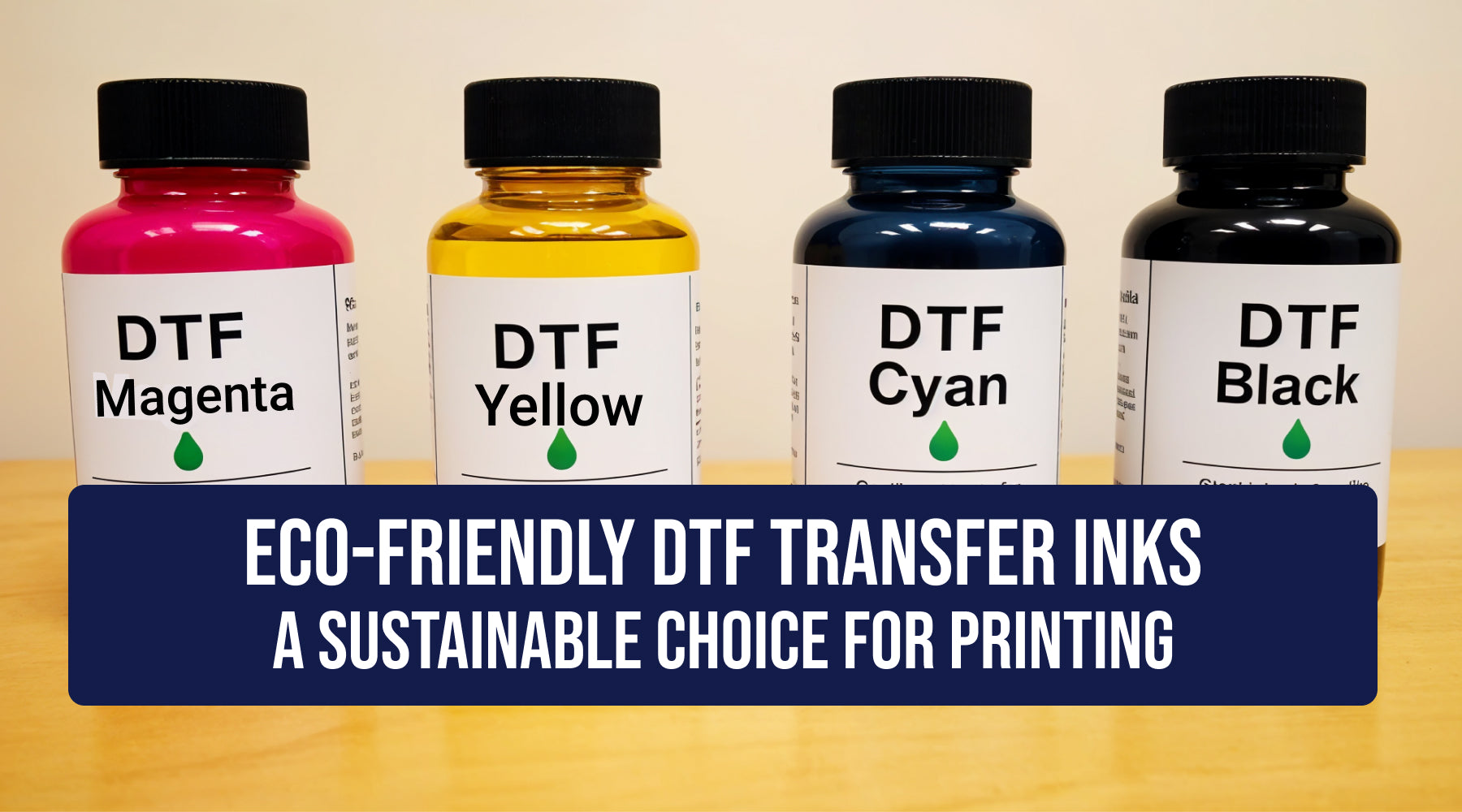Having an environment-friendly world now, the trend has thus led businesses and consumers to make environmental choices in almost every field of life. Direct-to-film printing has increasingly hit recognized popularity in the recent past with its uniqueness in flexibility and the best quality in prints. In the recent past, DTF printing has become a preferred printing process. It can be rightly stated that DTF printing is the best not only in the process of direct-to-film transfer but also in the quality of prints involved. In this blog, we'll look into the advantages of using eco friendly inks how this contributes to more environmentally friendly working processes, and why it is best for a business needing to be sustainable.
Understanding Eco-Friendly DTF Transfer Inks
Eco-friendly printer inks are formulated to have as minimal a marginal impact on the environment as possible without being at a significant quality disadvantage for print. Normally, such inks will be water-based with very few harmful chemicals and low VOCs in a form not harmful to the atmosphere. Normally, conventional printing inks have elements dangerous to the environment, which pose a threat during their manufacture, use, and disposal. On the other hand, eco-friendly ink is prepared from renewable raw materials and is biodegradable, hence safer for both human health and the environment.
The Rise of Eco-Friendly Inks in the Printing Industry
Other industries are derived from sustainable operations, resulting in increased demand for eco friendly inks. Until now, the printing industry has been known to be an industry that heavily relies on the use of solvent-based inks. The industry is therefore often noted and criticized for its poor environmental footprint. While the aforementioned inks have been very effective, they release dangerous chemicals into the atmosphere and water, thus contributing to pollution and health hazards. Though very effective, solvent-based inks have harmful chemicals in the air and water, contributing to pollution and human health hazards. Thus, manufacturers have started developing eco-friendly alternatives that would do the same but not with detrimental effects.
Also Read: How Much Does a DTF Printer Cost?
The introduction of eco friendly inks will come in handy to an already colorful and character-filled industry. Such inks shall bring bright coloration, and excellent durability, and cater to the rising consumer demand for 'green' products. One will reduce the carbon footprint by opting for eco-friendly inks and appeal to environmentally conscious customers.
Benefits of Using Eco-Friendly DTF Transfer Inks

Reduced Environmental Impact
Among the most significant benefits of using eco friendly printer ink is the environmentally friendly nature of the ink. In the production of green inks, natural and renewable resources are applied in comparison to conventional inks. The green inks do not possess hazardous chemicals that making them eco-friendly when produced, used, and even when disposed of. These inks also lead to low VOC emissions, therefore reducing air pollution and enhancing air quality indoors.
Biodegradability
Eco friendly inks are formulated to easily degrade, and in the process, reduce the number of wastes that reach landfills. Conventional inks take several decades to decompose and, in the process, release very harmful substances into the soil and water. In contrast, eco-friendly inks break down without leaving harmful residues, making them a more plausible choice for times when sustainability matters most.
Safe for Human Health
Traditional printing inks have always included hazardous chemicals like heavy metals and phthalates, which expose workers and consumers to serious health problems. There are no such dangerous elements in eco friendly screen printing ink or eco friendly fabric ink, so they will be easier and safer to use while at work or in use. This is majorly important in a line of business like textile printing, where inks come directly into contact with the skin.
Also Read: How to Make a DTF Gang Sheet
High-Quality Prints
Environmentally friendly, the eco friendly inks never compromise on the quality of printing. The resultant color is vivid and durable, with excellent anti-fade and anti-crack. Eco-friendly inks do a good job on many different substrates, including fabrics, papers, and other general ones, that can be compared with traditional inks.
Compliance with Environmental Regulations
With the increasing regulations from governments worldwide concerning environmental activities, businesses have had to adjust to sustainable operations in many ways. Eco friendly printing inks avoid fines and penalties to a company by working within the legislative regulations. Moreover, the ability to promote your products as eco-friendly improves brand reputation and helps in targeting the growing group of green consumers.
How Eco-Friendly DTF Transfer Inks Work
Eco friendly inks will work much the same as regular inks but with added benefits associated with their use on the environment. Most of these inks are usually water-based; that's to say, water is the principal solvent as opposed to other harsh chemicals. This makes the water-based inks easier to clean up, and they have reduced emissions, hence being a better option for sustainability.
Basically, DTF printing is a process whereby the design is printed on special transfer film using eco-friendly inks. After that, the film with the printed design is pressed on a substrate-like fabric under a heat press to produce a high-quality print that is hard-wearing and friendly to the environment. The eco-friendly inks shall ensure the final product is safe for the consumer and poses a minimal impact on the environment.
Common Myths About Eco-Friendly Inks

Even though eco-friendly DTF transfer inks become ever more popular, there are still some wrong concepts about them. Let us debunk some of the most common myths.
Myth: Eco-friendly inks are less vivid compared to traditional inks.
Reality: Green inks are just as vibrant, if not more so, than conventional inks. With the newest inks and ink formulation advances, eco inks today offer exactly the very same level of intensity and permanence of colors that conventional inks provide.
Myth: Eco-friendly inks cost more.
Reality: While the up-front costs associated with eco-friendly inks may be higher, in reality, they provide a potentially long-term savings opportunity. Often, these inks are more efficient at the same tasks that use less actual ink and can eliminate a big financial headache related to compliance with environmental regulations.
Also Read: How to Cure DTF Powder with a Heat Press?
Myth: Eco-friendly inks are suitable only for specific print jobs.
Reality: Eco-friendly inks can prove to be competent with every kind of printing application, whether it's DTF, screen, or DTG printing. Inks that follow this route could turn out to be the best for T-shirts, posters, and packaging.
Even though eco-friendly DTF transfer inks become ever more popular, there are still some wrong concepts about them. Let us debunk some of the most common myths.
Since the trends are getting sustainable in almost every industry, the same goes for printing. Eco-friendly DTF transfer inks are forming a determinant factor in the future to reduce the harm printing can inflict on the environment. They provide a long list of benefits, starting from the reduction of harmful emissions to quality prints that are safe both for the environment and for human health.
Eco friendly printing solutions are not just a fad for businesses that want to be way ahead in today's competitive market. With eco friendly inks, you will not only cut your carbon footprint but also comply with the authorities' environmental policies and show a clean heart towards a fast-growing community of green consumers.
Ready to make that switch to eco-friendly DTF transfer inks? Discover our wide range of sustainable printing solutions with DTF NC. Our eco-friendly inks have been developed to ensure quality print while minimizing environmental impact. Join us in making a difference to our planet—one print at a time.
Add some eco friendly printer ink to your printing procedure for a superior product and a healthier world. The time of change is now, so jump in and see the difference with eco-friendly inks.
FAQs
Is DTF printing environmentally friendly?
Yes, DTF printing can be eco-friendly, particularly if you use DTF transfer inks that are eco-friendly, made from a water base, biodegradable, and free from harmful chemicals; it makes them very feasible for sustainable printing.
Is direct-to-garment printing eco-friendly?
Eco-friendly DTG printing is one using water-based and nontoxic inks. So, by having a choice of eco friendly fabric ink, you can reduce the environmental impact of direct-to-garment printing and make a product suitable for the consumer to consume.
Is heat transfer printing eco-friendly?
Heat transfer printing can be eco-friendly when using eco-friendly inks and transfer films. Water-based inks and recyclable films reduce waste and emissions, making the process more sustainable.
Is DTF film recyclable?
Yes, some DTF films are recyclable, especially those made from PET (polyethylene terephthalate) materials. However, it's essential to check the manufacturer's specifications to ensure that the film you are using is recyclable.









12 comments
Elliottphync
https://dissertation-now.com/essaygoaway-com/
Rickeybor
https://winnita-promocode.com/
WilliamDow
https://www.isxgames.com/f/members/melbetpakistan.18290/#about
1x-bet-india
I consider, that you are not right. Write to me in PM, we will discuss.
melbetbdofficial
I can recommend to visit to you a site on which there is a lot of information on a theme interesting you.